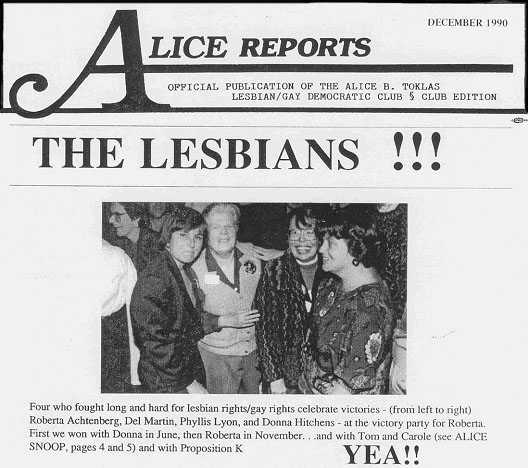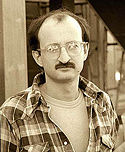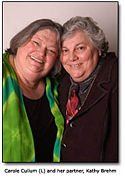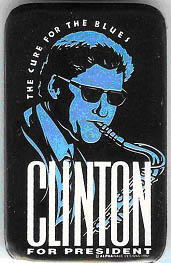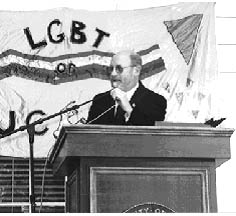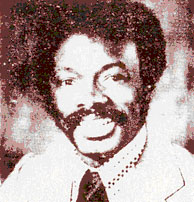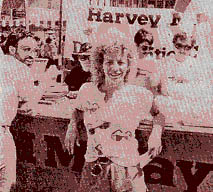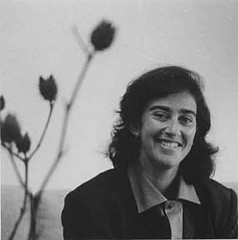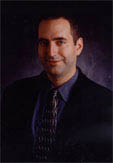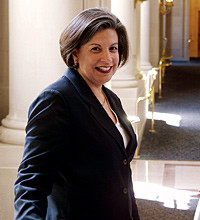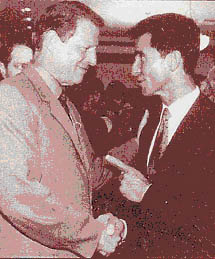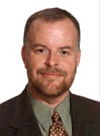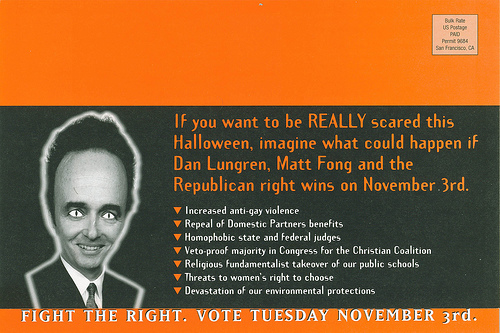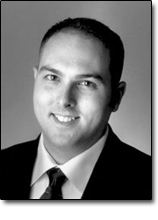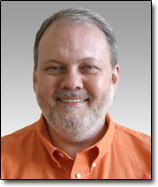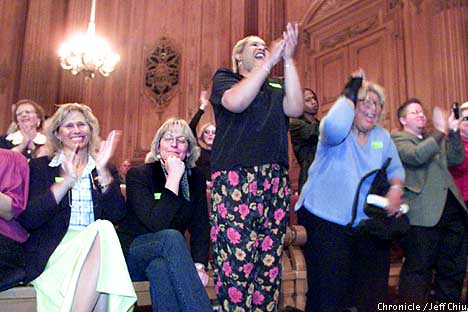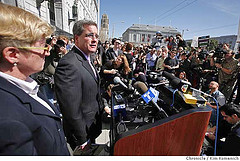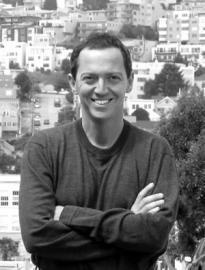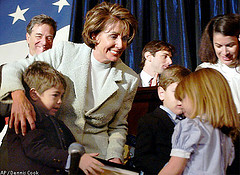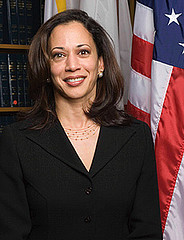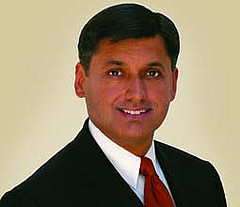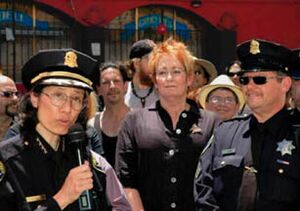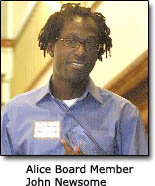Difference between revisions of "1990’s-2000’s: An Organized Constituency Finds its Power"
| Line 22: | Line 22: | ||
The Lavender sweep had national repercussions as it became a precursor to LGBT campaign organizing prior to the 1992 presidential election, and established the San Francisco lesbian and gay community as a base of power that could help win local, state and national elections in the future. | The Lavender sweep had national repercussions as it became a precursor to LGBT campaign organizing prior to the 1992 presidential election, and established the San Francisco lesbian and gay community as a base of power that could help win local, state and national elections in the future. | ||
| − | + | ||
'''1992 “The Year of the Woman”''' | '''1992 “The Year of the Woman”''' | ||
| − | In 1992 California made history by sending Dianne Feinstein and Barbara Boxer to the U.S. Senate and the LGBT community played a key role in that success. [http://www.movieweb.com/tv/TVetLjehBZKMii/HUgkhlhm04Mnio Political pundits billed 1992 as “The Year of the Woman”] because women candidates made successful efforts to break into the male dominated US Senate, which had only 2 female members in office at that time. Feinstein’s campaign used the slogan ‘2% is good for milk but not for equality’ in the US Senate. | + | In 1992 California made history by sending Dianne Feinstein and Barbara Boxer to the U.S. Senate and the LGBT community played a key role in that success. [http://www.movieweb.com/tv/TVetLjehBZKMii/HUgkhlhm04Mnio Political pundits billed 1992 as “The Year of the Woman”] because women candidates made successful efforts to break into the male dominated US Senate, which had only 2 female members in office at that time. Feinstein’s campaign used the slogan ‘2% is good for milk but not for equality’ in the US Senate. Senator Barbara Boxer won the election for US Senator in 1992 against radio commentator Bruce Herschensohn by 5% of the vote with the crucial assistance of the LGBT community. Her openly gay political consultant and fundraiser Dick Pabich was a key strategist for the Boxer campaign. Pabich adopted a strategy for Boxer to explicitly build a California majority of women, gay men and minority constituencies. Alice helped boost turnout in San Francisco to provide the margin of difference in that campaign. <ref>Wikipedia. [http://en.wikipedia.org/wiki/Year_of_the_Woman The Year of the Woman]</ref> |
| + | <div style="text-align: center;"> | ||
| + | <youtube>kmoDiBgzTpg&feature=fvw</youtube> | ||
| + | </div> | ||
'''Bill Clinton becomes President''' | '''Bill Clinton becomes President''' | ||
| Line 37: | Line 40: | ||
As an early endorser of Bill Clinton, Alice established itself as a “Friend of Bill’s” before other Democratic Clubs had gotten in the act, and Alice helped propel Roberta Achtenberg into the limelight of the Democratic Convention, supporting her eventual selection as Housing Undersecretary. | As an early endorser of Bill Clinton, Alice established itself as a “Friend of Bill’s” before other Democratic Clubs had gotten in the act, and Alice helped propel Roberta Achtenberg into the limelight of the Democratic Convention, supporting her eventual selection as Housing Undersecretary. | ||
| + | <div style="text-align: center;"> | ||
| + | <youtube>Ufvxpxx1c9Q&feature=PlayList&p=1285CD6173221E8C&index=7</youtube> | ||
| + | </div> | ||
| − | + | At the Democratic Convention, Bill Clinton was outspoken in his support of the LGBT Community, breaking the ‘conspiracy of silence’ that had long dominated national discussions of gay issues, even among Democratic politics. At the 1992 Democratic Convention, [http://www.youtube.com/watch?v=8EXNrdzwB4M Clinton specifically talked about “gay people”], [43 minutes into speech], whereas in the past, democratic presidential contenders such as George McGovern and Jimmy Carter had said they supported “Civil Rights” when referring to LGBT people, but not actually identifying directly with our community at the Democratic Conventions. Clinton went on to appoint Roberta Achtenberg as Undersecretary of Housing, prompting archconservative [http://www.youtube.com/watch?v=-7CykYlDevI&feature=fvw Jesse Helms to famously refer to her as “that damn lesbian!”] Clinton also appointed Democratic fundraiser and gay philanthropist Jim Hormel to be a U.S. Ambassador to Luxembourg, the first openly gay person to serve as a U.S. Ambassador. <ref>[http://www.presidency.ucsb.edu/ws/index.php?pid=29610 1992 Democratic National Party Platform] "Gay Plank" under “Civil Rights and Equal Rights” section of the platform, it states: “We will reverse the Bush Administration's assault on civil rights enforcement, and instead work to... aggressively prosecute hate crimes... provide civil rights protection for gay men and lesbians and an end to Defense Department discrimination”</ref> <ref> Wikipedia. [http://en.wikipedia.org/wiki/Roberta_Achtenberg Roberta Achtenberg]</ref> <ref> [http://articles.sfgate.com/1999-06-05/news/17690632_1_hormel-s-nomination-james-hormel-first-openly-gay-ambassador Sandalow, Marc. 1999. Clinton Bypasses Senate, Names Hormel Ambassador. ''San Francisco Chronicle.'' June 5.]</ref> | |
Revision as of 03:43, 22 March 2010
The 1990 "Lavender Sweep"
While San Francisco was confronting AIDS, there was an urgent sense that LGBT people needed to be in positions of power. It was not enough anymore to have friends of our community supporting us. We needed a place at the table. 1990 saw the culmination of two decades of political work by Alice and the Milk Club to bring our community to the table. All the hard work had finally come to success when the two clubs worked together in the historic 1990 Lavender Sweep (the first of two sweeps, the second being in 1994).
The 1990 sweep successfully pushed several candidates over the top to become elected leaders. Lesbian Donna Hitchens won citywide as Superior Court Judge. Lesbians Carole Migden and Roberta Achtenberg won races to join the Board of Supervisors, and Tom Ammiano became the first gay man elected to the San Francisco School Board. Years of work had paid off for all the candidates who had been trying to get into office, and work by Alice was crucial to these victories. [1] [2]
Alice Involvement in the Lavender Sweeps and broader community work:
Campaigns are not won by leaders simply rising to power. It takes incredible work and commitment of people in the community to make a difference. It takes fundraising. It takes strategy. It takes coalition building. It takes development of successful messages and professional campaign materials. It takes enlisting support, one endorsement at a time. And it takes courage to stand by your vision even in the face of opposition. That’s exactly what Alice and the community did to create the 1990 and 1994 landmark elections. There are countless heroes in these efforts that deserve to be recognized, and a few of these are Dick Pabich, Jim Hormel and Mark Leno who raised money for numerous community efforts throughout these years. Jim Hormel not only supported LGBT candidates, but also raised enormous sums for the new Public Library’s Hormel Center for LGBT research. Mark Leno became a lead fundraiser and strategist for building the new LGBT Community Center] and one of Carole Migden’s top fundraisers. Dick Pabich not only helped Carole Migden raise funds to get into office, but he became a chief fundraiser for Senator Barbara Boxer, paving the way for one of our nation’s most outspoken national advocates for LGBT rights in the United States Senate. Robert Barnes and campaign consultant Jim Rivaldo were instrumental in establishing a professional campaign operation for LGBT advocacy. Barnes became a key advisor to LGBT leaders and Rivaldo became a lead graphics designer for slate cards, billboards, and countless materials done pro-bono for LGBT causes during this time. Carole Cullum at the law firm of Cullum and Sena also provided crucial legal advice to LGBT campaigns while long time LGBT activists Martha Knutzen, Fran Kipnis and Denny Edelman gave non-stop volunteer work on behalf of community causes throughout these years as well. There were so many others, but this gives a small sense of the broad coalition of work that was being done to lay the foundation for LGBT political power and LGBT social services in San Francisco. [3] [4] [5]
National Repercussions of the 1990 Lavender Sweep
The Lavender sweep had national repercussions as it became a precursor to LGBT campaign organizing prior to the 1992 presidential election, and established the San Francisco lesbian and gay community as a base of power that could help win local, state and national elections in the future.
1992 “The Year of the Woman”
In 1992 California made history by sending Dianne Feinstein and Barbara Boxer to the U.S. Senate and the LGBT community played a key role in that success. Political pundits billed 1992 as “The Year of the Woman” because women candidates made successful efforts to break into the male dominated US Senate, which had only 2 female members in office at that time. Feinstein’s campaign used the slogan ‘2% is good for milk but not for equality’ in the US Senate. Senator Barbara Boxer won the election for US Senator in 1992 against radio commentator Bruce Herschensohn by 5% of the vote with the crucial assistance of the LGBT community. Her openly gay political consultant and fundraiser Dick Pabich was a key strategist for the Boxer campaign. Pabich adopted a strategy for Boxer to explicitly build a California majority of women, gay men and minority constituencies. Alice helped boost turnout in San Francisco to provide the margin of difference in that campaign. [6]
<youtube>kmoDiBgzTpg&feature=fvw</youtube>
Bill Clinton becomes President
That year Alice became an important player in Democratic Presidential politics as well. Robert Barnes, chair of the Alice B. Toklas Club had this to say about the approaching presidential election in the May 1992 edition of Alice Reports:
As an early endorser of Bill Clinton, Alice established itself as a “Friend of Bill’s” before other Democratic Clubs had gotten in the act, and Alice helped propel Roberta Achtenberg into the limelight of the Democratic Convention, supporting her eventual selection as Housing Undersecretary.
<youtube>Ufvxpxx1c9Q&feature=PlayList&p=1285CD6173221E8C&index=7</youtube>
At the Democratic Convention, Bill Clinton was outspoken in his support of the LGBT Community, breaking the ‘conspiracy of silence’ that had long dominated national discussions of gay issues, even among Democratic politics. At the 1992 Democratic Convention, Clinton specifically talked about “gay people”, [43 minutes into speech], whereas in the past, democratic presidential contenders such as George McGovern and Jimmy Carter had said they supported “Civil Rights” when referring to LGBT people, but not actually identifying directly with our community at the Democratic Conventions. Clinton went on to appoint Roberta Achtenberg as Undersecretary of Housing, prompting archconservative Jesse Helms to famously refer to her as “that damn lesbian!” Clinton also appointed Democratic fundraiser and gay philanthropist Jim Hormel to be a U.S. Ambassador to Luxembourg, the first openly gay person to serve as a U.S. Ambassador. [7] [8] [9]
Alice supports Mayor John Laird of Santa Cruz in his 1993 run for Assembly:
In September, 1993, many Alice members volunteered in the campaign to elect openly gay mayor John Laird of Santa Cruz to the State Assembly, as was reported by co-chair Mathew Rothschild in the Sept. 1993 edition of Alice Reports. Nearly a decade later, John joined Mark Leno as the first two gay men to be elected to the Assembly in 2002. [10]
Susan Leal Replaces Roberta Achtenberg on the Board of Supervisors.
Susan Leal was appointed June 7th, 1993 by Mayor Frank Jordan to serve on the Board of Supervisors succeeding Roberta Achtenberg. Susan joined Alice in endorsing Willie Brown in 1995 and began a strong relationship with the club, building towards her run for mayor, which Alice endorsed, in 2003. As a Latina lesbian, she continued the tradition of broadening San Francisco’s LGBT leadership diversity. [11] [12]
The 1994 "Lavender Sweep"
In 1994 San Francisco had a second “Lavender Sweep” with openly gay candidates Susan Leal, Carole Migden and Tom Ammiano being elected to the Board of Supervisors, and Leslie Katz and Lawrence Wong winning election to the Community College Board. Alice was instrumental in the fight, working in coalition with the Milk Club. Susan Leal went on to Chair the powerful Finance Committee on the Board of Supervisors, ensuring that much needed funds would be directed towards HIV and AIDS services. With the 1994 Lavender Sweep, Alice and the LGBT Community demonstrated a firmly established base of power in San Francisco. The community that previously needed district elections to win a single elected office was now a major power broker sweeping several candidates into numerous offices for a second time. San Francisco’s political establishment would from this point forward be walking in close step with the LGBT community and its political goals.[13] [14]
Willie Brown Elected Mayor:
With newly imposed term limits, longtime community ally Assemblyman Willie Brown was forced out of office and ran for Mayor in 1995. A major power broker for the state, it was believed that he could beat conservative Mayor Frank Jordan and bring unity to a deeply divided city. Prior to his campaign, Willie Brown met with Carole Migden, Alice Chair Mathew Rothschild, Milk Club Chair Martha Knutzen, Fran Kipnis and other LGBT community members to plan his run for Mayor. In the past, the lesbian and gay community had been on the ‘outside’ in brokering power for the city, but with the Lavender Sweep, lesbian and gay leaders were now recognized as a strong political force in San Francisco and Speaker Brown formed a direct alliance with the community in his race for Mayor. Brown won the election and went on to appoint more LGBT people to lead city departments and commissions than ever before in the city’s history. He also signed the Equal Benefits Ordinance to require businesses that contract with the city to provide equal benefits to domestic partners that are offered to married couples.[15] [16] [17] [18]
Carole Migden replaces Willie Brown in the Assembly:
Willie Brown, the legendary “Ayatollah of the Assembly” who represented San Francisco and the Democratic Party incredibly well for decades, including early support for LGBT rights through his consensual sex laws, stepped down due to newly imposed term limits and Carole Migden replaced him. Alice’s longstanding relationship with Willie Brown and Carole Migden helped position Migden to become the second LGBT person ever sent to the California State Legislature. Carole won election to the seat later in 1998.
Labor Organizing - Training for Alice Members
Jack Gribbon was a labor organizer who trained Alice members how to organize during the Willie Brown Campaign for Mayor. A waiter who organized thousands of hospitality workers in the Hotel Employees and Restaurant Employees Union Local 2 (H.E.R.E), Jack ran Willie Brown’s 1995 field campaign and enlisted Alice members to spend months before the Mayoral election tirelessly calling voter lists, identifying Brown supporters and walking precincts to turn voters out on Election Day. Jack originally got involved with Alice during the Domestic Partnership campaigns of the 1980’s, and his training became a model that worked. Alice member Fran Kipnis, for instance, turned out 99% of her own precinct in 1992, the same year that Barbara Boxer won her U.S. Senate race by 5%. Alice would sign up precinct captains, identify voters and track down if they were voting by mail or voting on Election Day, and would work relentlessly on Election Day until the polls closed, taking nothing for granted until the fight was over. Gribbon’s approach continues to be the model the club uses to this day, and LGBT areas of San Francisco such as the Castro District are known to be some of the highest turnout districts in the city every Election Day.
Leslie Katz Elected to the Board of Supervisors:
In 1996 Leslie Katz was elected to the Board of Supervisors after being appointed by Mayor Brown earlier that year. Alice worked tirelessly on Supervisor Katz’s campaign, as Leslie had been a longstanding member of the club who had already shown her strong leadership capabilities over many years. One of her staff, Geoff Kors, would go on to become the Executive Director for Equality California. [19] [20]
Tom Radulovich elected to BART Board:
Tom Radulovich was elected to the Bay Area Rapid Transit (BART) Board of Directors in November 1996 representing the 9th District in San Francisco.[21] An Alice supported candidate over the years and gay official, Tom later made a run for the Board of Supervisors. He has served on the BART Board for a decade while working tirelessly on housing and transit issues, taking a strong leadership role in groups like the San Francisco Planning and Urban Research (SPUR) and the Housing Action Coalition (HAC).
The Equal Benefits Ordinance: San Francisco Flexes its Muscles.
In 1996, San Francisco enacted an ordinance that had a broad impact on the entire nation, and Alice supported leaders were instrumental to passing this legislation. Supervisor Leslie Katz, Supervisor Tom Ammiano, Supervisor Susan Leal, and Mayor Willie Brown together championed San Francisco’s landmark Equal Benefits Ordinance to require that businesses that contract with the City of San Francisco must provide equal benefits to domestic partners that they give to married partners. This law swept the nation in its impact, paving the way for hundreds of businesses to adopt domestic partnership benefits. Some businesses like United Airlines initially fought the ordinance but San Francisco leaders stood firm in demanding equality and the City prevailed. The ordinance became a model for similar laws passed throughout the nation, and the model for Christine Kehoe’s California Assembly Bill 17, signed by Governor Davis, to require businesses which contract with the state of California to provide equal benefits to domestic partners. This is one clear example where a San Francisco ordinance passed by Alice supported legislators managed to change not only the City of San Francisco, but also California and the nation. [22] [23] [24] [25] [26]
Susan Leal Becomes San Francisco City Treasurer:
In 1998 Susan Leal was appointed to become the City Treasurer, where she managed the City’s $3 billion portfolio. Her investment policies and decisions produced a greater return during her period of service than any major county in the state. In 2001 Susan was elected Treasurer for another term with 87% of the vote, due to her reputation as a strong, effective manager of the city’s finances. Alice endorsed Susan’s candidacy and campaigned hard for her victory.
Domestic Partnership: New laws enacted for California.
Alice strongly supported Carole Migden as she went to the Assembly and introduced AB 26, which created a registry for Domestic Partnership and gave Domestic Partners many of the same rights (such as hospital visitation rights) that married couples enjoy. Later, Assemblywoman Jackie Goldberg would introduce AB 205, an extensive set of rights and responsibilities for domestic partners that almost mirrored marriage, building on Carole’s earlier work. [27] [28]
Mark Leno Elected to the Board of Supervisors
In 1998 candidate Mark Leno won election to the Board of Supervisors after being appointed earlier that year. Leno had spent years prior to his time on the Board of Supervisors working as a lead organizer and fundraiser for the LGBT Center. He was a key player in getting the Center built. Leno was also a longstanding member of Alice before his rise to office. As a Supervisor, Leno led the effort to create a transitional housing facility designed specifically to address the needs of LGBT homeless youth as well as passing the City’s first Inclusionary Housing Ordinance to mandate that developers construct a percentage of affordable housing as they develop in a city with skyrocketing housing costs. [29]
Proposition 22 - The Knight Initiative:
In 2000, California voters were subjected to a divisive ballot measure that was designed to turn back the clock on LGBT rights – Proposition 22, the Knight Initiative. The measure was written to clarify that out-of-state marriages could not impact California marriage law regarding same sex couples. Voters passed the measure, despite the vigorous efforts of Alice and our LGBT leaders. Mark Leno (who would later introduce AB 849, the Marriage Equality Bill) worked especially hard to stop the initiative, traveling as a statewide campaign spokesman against the measure. Alice worked tirelessly to stop the Knight Initiative, and continues to be part of marriage equality organizing. [30]
Robert Barnes
Robert Barnes deserves special mention because of his work on behalf of Alice, his commitment to LGBT rights, his work at the California Democratic Party, and his often-controversial approach to politics that dominated Alice for much of the late ‘90’s. He was an Alice Co-Chair who became a close advisor to many of San Francisco’s most successful politicians. Carole Migden, Mark Leno, Willie Brown, Dennis Herrera, Leslie Katz, Susan Leal, Tom Radulovich, Natalie Berg, Mabel Teng, Donna Hitchens, Kevin McCarthy, School Board members Dan Kelly, Juanita Owens, Lawrence Wong, and many other San Francisco officials worked closely with Robert Barnes at various points in their careers. [31] [32] [33] [34] [35] [36] [37] [38]
He grew up in San Francisco in a working class family closely connected to politics. His father was a machinist and labor activist and in 1977 ran for District Supervisor against Dan White. Robert got into politics himself running for the BART Board and the Board of Education, but after losing these races, (one of them being to Tom Ammiano in his race for the Board of Education) Robert got involved in politics behind the scenes. He was particularly involved in Democratic Party activities and was the Chair of the California Democratic Party’s Gay Caucus for many years.
San Francisco has some of the most colorful, bombastic, and sometimes brilliant people in politics. Robert was one of them. He had an incredible sense of humor and got away with controversial jokes that most professionals would never dream of trying. He could say things that were unthinkable, throwing insiders out of their comfort zone, then warming them back up with charm, and closing the deal with masterful delivery. He was an extremely funny person in a somewhat bland professional scene.
Robert Barnes, Chair of the Alice B. Toklas Club and Prominent Democratic Party Activist, died on August 9th, 2002 of Guillain-Barre Syndrome, just months before his candidate, Mark Leno, became the first gay man elected to the California State Assembly.
Robert’s work in the Alice B. Toklas Club:
For several years the Alice B. Toklas Club had been struggling during the AIDS epidemic, as members became focused on saving lives and had little time or energy to spare on Democratic politics. People were exhausted. During this vacuum of leadership at Alice, Robert Barnes almost single-handedly resurrected the club to continue political work. [39] [40]
While Robert took on leadership at Alice, he simultaneously developed a business in political consulting specializing in slate mail. The period where Robert took the lead at Alice was controversial because many of the political goals of the club seemed to be designed by Robert with his business clients in mind. Many people in the community felt that Robert was serving his own goals at the expense of the community. This fueled the Alice/Milk longstanding rivalry - the belief that Alice was becoming a front for Robert’s political work. But Robert worked on a variety of projects that were widely supported as well, such as the School Bond campaign and the 1994 Lavender Sweep. He worked relentlessly on the Octavia Boulevard campaign and worked very closely with Alice to promote the San Francisco Women’s Building, supporting their right to remove a bar from the premise and make it a safe space for all women using the facility. Robert also ran the campaigns of many important LGBT candidates and he worked tirelessly as the State Party Chair of the LGBT Caucus. His positioning Alice early with the Clinton campaign also proved to be invaluable for the community. [41] [42] [43]
Perhaps Robert’s most important contribution was to bring numerous young people into politics, showing them how to be professional advocates for the LGBT community. He invited people who had no experience with politics to get involved, teaching them how to manage campaigns, how to work with elected officials, how to put together slate cards, how to design ballot arguments, how to raise money, how to write press releases, how to work with the state party, how to craft a winning message, and how to become successful in advancing the LGBT cause. He taught many people how to be professional leaders.
Alice / Milk Rivalries
The Alice and Milk Democratic clubs have throughout their existence been somewhat at odds with each other by virtue of the fact that the Milk Club formed out of a difference in political orientation and approach from Alice. Sometimes this rivalry has overshadowed any ability of the clubs to work together, and sometimes the two clubs have worked as if there were no rivalry at all. It’s fair to say that having two Democratic Clubs offers checks and balances on whether either club is acting genuinely in the interest of the community. Open dialogue and critique is definitely positive.
The history of tensions between the clubs could be seen from the beginning but grew to a high point in 1995 during the Willie Brown and Roberta Achtenberg campaign for Mayor. Alice endorsed Willie Brown citing his years of leadership and commitment to the community, as well as the desire to unseat Mayor Jordan with a strong, viable candidate at a time when no one could be certain that Mayor Jordan could be beaten. Roberta Achtenberg entered the race later and many members of the Harvey Milk Democratic Club supported her, wanting to see the first lesbian Mayor of San Francisco. Brown beat Jordan and Alice was absolutely critical to his victory.
The Achtenberg/Brown election was only one episode of a long period of division between the clubs. An event that further crystallized the tension was the Mayoral Election of 1999 when Tom Ammiano put himself forward as a write-in candidate late in the election cycle against Mayor Willie Brown. Ammiano waged a spirited campaign with his write-in candidacy, garnering national attention and enthusiasm, but the race exacerbated long-standing tensions between the Alice and Milk Clubs. Alice members were conflicted about the election because the club promotes LGBT empowerment, but Alice members had a long-standing relationship with Mayor Brown and were proud of his important work for the LGBT community, such as the landmark Equal Benefits Ordinance. Alice had already made its commitment to Brown before Ammiano got into the race with his write-in candidacy, so the club would have had to back out of its endorsement of a longstanding ally. Alice’s decision to stick with endorsing Mayor Brown hastened a growing divide between the two clubs. [44]
The next major event that accelerated the rise in tension between the clubs was the 2000 supervisorial race between Mark Leno and Eileen Hansen. District elections had been reinstated that year and the Milk Club endorsed lesbian candidate Eileen Hansen for District 8, while Alice endorsed gay incumbent supervisor Mark Leno. Leno ultimately won the race because of his strong progressive credentials and history of accomplishment on the Board.
A crescendo in the long rift between the clubs came when Supervisor Leno ran for State Assembly in 2002 with the strong endorsement of Alice, while the Milk Club endorsed Harry Britt (who had been retired from elective office for over a decade). Mark Leno went on to pass progressive legislation to protect transgender people in employment and housing (AB 196) and passed the historic marriage equality bill (AB 849).[45]
[46] [47]
Healing the Rift: After the 2000 Leno/Hansen race, and after the 2002 Assembly race, leaders from Alice and Milk made a concerted effort to improve relations between the two clubs. Alice Co-Chair Rich Kowalewski, one of many who has been credited with working tirelessly to improve the Alice/Milk relationship, had this to say about the dynamics between the two clubs:
Rich, Paul, Theresa, Laura, Jerry, Debra, Robert, Michael, and Scott Wiener all did an excellent job of changing course in the direction of relationships between our two clubs. The community continues to benefit from Milk and Alice working together.
Transgender Rights
Throughout Alice’s history, most of the focus on issues and candidates had been on gay and lesbian rights. As the new millennium was ushered in, Alice supported officeholders took a lead in addressing transgender rights, making it a top priority with huge success. Shortly after his election in 2000, Supervisor Leno created the Transgender Civil Rights Implementation Task Force, which advanced changes in city policy related to transgender people. [48] Following task force identified goals, Mayor Willie Brown named task force member Theresa Sparks to become the first Transgender Human Rights Commissioner. Leno authored the Employer Notification Law signed by Mayor Brown, requiring employers to post anti-discrimination notifications in places of business that specify that the city bans discrimination against transgender people. [49] The Task Force addressed law enforcement issues and a joint task force between the Police and Human Rights Commission was created to address law enforcement treatment of transgender citizens. The Police Departments Office of Citizens Complaints (OCC) also adopted recommendations from the task force to implement sensitivity training and protocols regarding police interactions with transgender people.[50] Theresa Sparks moved on to become San Francisco’s first transgender Police Commissioner, and Cecilia Chung replaced Theresa on the Human Rights Commission, thus maintaining two important commission seats. [51] [52] Cecilia, Theresa and other transgender leaders went beyond the work of this task force to join with community leaders in creating the transgender pride march on LGBT Pride weekend, and participated in the formation of the Transgender Political Caucus among many other remarkable efforts during this time. [53]
The San Francisco Transgender Health Plan – A First and Model for the Nation.
The most historic advancement that came out of the work of the Task Force was a change to San Francisco’s health plan for city employees. Supervisor Leno authored and Mayor Brown signed an ordinance to change the city’s health plan to include sex reassignment surgeries, hormone therapy and other care for transgender people as part of the city health plan.[54] The impact of this change went far beyond city employees. [55] Insurance providers that contract with the city were now required to include transgender care as part of the benefit options available in their health coverage, paving the way for transgender healthcare benefits to be available to businesses around California and the nation.[56] Previously, insurance providers had not even offered these benefits. Task force members were written up in full-page stories in the New York Times and other national newspapers, while Leno appeared on television and talk radio stations throughout the country to discuss the issue. The media coverage reached South America, Europe, Australia, Asia and all over the United States. This is yet another clear example of Alice supported legislators passing legislation that had an impact far beyond the City of San Francisco. [57]
Changing Alice’s name
In 2001 under the leadership of Chair Paul Hogan, Alice made an important change to rename the club “The Alice B Toklas Lesbian, Gay, Bisexual and Transgender Democratic Club.” Alice took the lead in outreaching to the transgender community and was the first of the two major LGBT Democratic Clubs in San Francisco to include “Transgender” in its official name. The vote to change the club’s name was unanimous. [58]
Alice Candidate Dennis Herrera becomes City Attorney
Alice member and Alice's endorsed candidate for City Attorney Dennis Herrera made a successful run for the job first in 2000, then again in 2005. A close friend of former Alice Co-Chair Robert Barnes, Herrera has been a steadfast ally of the club, continuing his longstanding commitment to LGBT rights. Herrera took the lead in defending the City’s action to marry same-sex couples and never wavered in his commitment to LGBT people.
Mark Leno Elected to State Assembly
Longtime Alice hero Mark Leno became the first gay man elected to the State Assembly, along with John Laird of Santa Cruz. Leno continued his groundbreaking work for the LGBT community with legislation such as Assembly Bill 196, signed by Governor Davis, which banned discrimination against transgender people in housing and employment. The bill protects transgender people in all areas of California from discrimination, and even strengthened protection in localities that previously banned transgender discrimination before the law. San Francisco’s local ordinance banning discrimination against transgender people had few actual remedies for violation of the law. With changes to state law, employers and landlords now face serious charges if they discriminate against transgender people in employment or housing.
California Legislature creates the LGBT Caucus
LGBT statewide activism showed enormous progress in the year 2002 as Assemblymembers Mark Leno, John Laird, Jackie Goldberg, Christine Kehoe and Senator Sheila Kuehl formed the California Legislature’s first LGBT Caucus. The five members saw the passage of crucial legislation signed into law including Leno’s AB 196 to ban discrimination against transgender people in employment and housing; Kehoe’s AB 17 to require companies that do business with the state of California to provide equal benefits offered to domestic partners and married couples; Goldberg’s AB 205 which upgraded domestic partnership legal rights and responsibilities in California to almost equal status to marriage; and Laird’s AB 1400 amending the Unruh Act to include sexual orientation and gender identity to the categories protected from discrimination in public accommodations. [59] [60]
Bevan Dufty Elected to the Board of Supervisors
In 2002, Longtime Alice member and gay candidate Bevan Dufty was elected as the Supervisor for the Castro in District 8. Dufty created an Improvement District for the Castro and worked closely with local neighborhood groups on a series of local changes that were designed to keep the Castro safe, clean and a place we can all take pride in. Bevan has worked with the State Library Commission to pursue funding for the LGBT Historical Society to expand its operations into a Castro facility, and he has been a tireless fighter for LGBT issues at City Hall.
Alice Friend Nancy Pelosi Becomes Democratic House Minority Leader
In 2003 Nancy Pelosi made a successful run for leader of the Democratic Party in Congress, which preceded her becoming Speaker of the House in 2006. The highest-ranking woman in office in American history, Nancy got there largely because of her impressive legislative record, fundraising, tactical skill for the party and with critical help from Alice. In 1987 Pelosi initially ran for Congress as a candidate against Harry Britt, and Alice was vital to her victory, narrowly winning the special election to replace former Congressman Philip Burton. In 1987 Pelosi initially ran for Congress as a candidate against Harry Britt. From Day One, Alice was there to help Pelosi become one of the most powerful leaders in America, and one of the LGBT community’s strongest allies. As a liberal from San Francisco, she would never have won the confidence of the national party if she could not back up her progressive values with financial leadership. Alice’s longtime support was an asset to her rise in power. Nancy has proven to be a true friend of the community for her years of leadership in supporting Ryan White Care Act funding for people with AIDS, her support of domestic partnership rights and other LGBT causes. Nancy is an historic American leader and Alice can be proud of playing a role in her success. [61] [62]
Susan Leal runs for Mayor
Longtime Alice friend Susan Leal made history as the first Latina lesbian to run for Mayor in San Francisco in 2003. Alice endorsed her candidacy and worked hard on her behalf. Leal said about the race in Curve Magazine: “what my candidacy does is it sends a message to women, whether they’re queer or women of color, that the last barriers could be broken.”
Alice Candidate Kamala Harris becomes District Attorney
In December of 2003, Kamala Harris was elected San Francisco District Attorney with the overwhelming support of Alice early in her campaign. A longtime advocate for LGBT rights, Kamala has proven to be an effective champion for our issues as the City’s DA. One of her most important fights on behalf of the community has been to combat the gay/transgender panic defense used in California to defend acts of violence against our community.[63] Law enforcement issues such as these have been critical to Alice since it’s beginning. The ‘Twinkie Defense’[64] used to give Dan White a lenient defense in his trial for the murder of Harvey Milk, and the ‘Transgender Panic’ argument used to defend the murderers of transgender high school student Gwen Araujo [65] are just two examples where legal arguments have been designed to play upon homo/transphobia in the judicial response to violence against the LGBT community. Our community must demand equal treatment by the judicial system and equal protection from law enforcement, and Kamala has been a very effective leader in fighting for these principles with the support of Alice. [66]
Carole Migden Elected to State Senate
Building on years of support from Alice, Carole Migden was elected in 2004 as the second lesbian ever (following Senator Sheila Kuehl) to the California State Senate. Migden had spent the interim years after she left the State Assembly as the Chair of the Board of Equalization prior to running for Senate. [67]
Former Alice Board Member Jose Cisneros becomes City Treasurer
In September 2004 Mayor Gavin Newsom appointed former Alice Board Member Jose Cisneros to become the city Treasurer. Once again, the work of Alice paid off with an effective city treasurer who is one of our closest allies. Cisneros went on to win a full term as treasurer later that year and continues to be a strong voice working with Alice in local government. [68]
Theresa Sparks becomes first Transgender Police Commissioner in San Francisco
In 2004 former Alice Chair Theresa Sparks was sworn in as San Francisco’s first transgender Police Commissioner and would later become elected President of that Commission. After years of advocacy around police issues, Alice saw one of its chairs take a leadership role directly on the police commission and transgender advocates saw transgender leaders serve as officials in the City. [69] [70]
Alice Candidate Phil Ting Becomes San Francisco’s Assessor / Recorder
In 2005 another close friend of Alice made a successful run for office as Phil Ting won election to City Assessor/Recorder. Mayor Newsom appointed Phil because of his strong progressive credentials, long history of professional work at the Assessor/Recorder’s office, and his reputation as a non-political choice for the job. Phil Ting was the most qualified candidate for Assessor / Recorder and the electorate voted him in with Alice’s strong support. [71]
Alice Joins Coalition Effort – “And Castro For All”
In 2005 Alice participated in a broad campaign to address charges of racism at a Castro business as the community had an important dialogue about racial justice. Many African Americans have felt that the Castro is not an inclusive space for communities of color. In this context, the Human Rights Commission issued a report about a Castro establishment finding the business had engaged in racially biased business practices.[72] During this time, Alice Board Member John Newsome had this to say about the issue:
Page References
- ↑ Alice B. Toklas LGBT Democratic Club. Alice Reports, January, 1990 Story on Donna Hitchens, first lesbian elected to Superior Court Judge
- ↑ McMillan, Dennis. 2008. Judge Donna Hitchens Named Woman Of The Year. San Francisco Bay Times. March 13.
- ↑ Wikipedia. Jim Hormel
- ↑ Hall, Carl T. 2000. Obituary, Dick Pabich Co-Managed Harvey Milk’s Campaign. San Francisco Chronicle. January 3.
- ↑ Wildermuth, John. 2007. Obituary, Jim Rivaldo – Political Consultant Brought Harvey Milk to Office. San Francisco Chronicle. October 18.
- ↑ Wikipedia. The Year of the Woman
- ↑ 1992 Democratic National Party Platform "Gay Plank" under “Civil Rights and Equal Rights” section of the platform, it states: “We will reverse the Bush Administration's assault on civil rights enforcement, and instead work to... aggressively prosecute hate crimes... provide civil rights protection for gay men and lesbians and an end to Defense Department discrimination”
- ↑ Wikipedia. Roberta Achtenberg
- ↑ Sandalow, Marc. 1999. Clinton Bypasses Senate, Names Hormel Ambassador. San Francisco Chronicle. June 5.
- ↑ Wikipedia. John Laird
- ↑ Wikipedia. Susan Leal
- ↑ Wikipedia. Frank Jordan
- ↑ Alice B. Toklas LGBT Democratic Club. Alice Reports, April, 1994, pg.1 1994 Lavender Sweep Story
- ↑ Alice B. Toklas LGBT Democratic Club. Alice Reports, April, 1994, pgs.2-3 1994 Lavender Sweep Story continued
- ↑ Alice B. Toklas LGBT Democratic Club. Alice Reports, October, 1995, pg.1 Why Alice supports Brown for Mayor + Alice supports Carole Migden in run for Assembly. Carole had been chair of the Milk Club in earlier years, but at this point in her career she was the favorite of Alice, working closely with political consultant Robert Barnes.
- ↑ Alice B. Toklas LGBT Democratic Club. Alice Reports, October, 1995, pg.2 Willie Brown & Carole Migden stories continued.
- ↑ Alice B. Toklas LGBT Democratic Club. Alice Reports, October, 1995, pg.3 Carole Migden story continued.
- ↑ Caffentzis, Joe. Found SF. Mayor Willie Brown
- ↑ Girlgeeks.org. Leslie Katz
- ↑ Equality California.
- ↑ Bay Area Rapid Transit
- ↑ San Francisco Human Rights Commission. Overview of the Equal Benefits Ordinance San Francisco Human Rights Commission document summarizing the 1996 San Francisco Equal Benefits Ordinance.
- ↑ Foremant, Todd. 1999. San Francisco's Nondiscrimination in City Contracts and Benefits Ordinance: A New Approach to Winning Domestic Partnership Benefits. University of Pennsylvania Journal of Labor and Employment Law Vol. 2:2 Essay on SF Equal Benefits Ordinance
- ↑ Human Rights Campaign. Press Release, December 1998 Urging Boycott of United Airlines over United Airlines initial opposition to the San Francisco Equal Benefits Ordinance
- ↑ Pavlik, Keith. 1999. United Airlines Bosses Buckle. Workers World. August 19th.
- ↑ California Legislature Lesbian, Gay, Bisexual and Transgender Caucus. Press Release October 14, 2003 Press release regarding AB 17, California's statewide Equal Benefits Ordinance that was modeled after San Francisco's successful ordinance
- ↑ National Center for Lesbian Rights. The Evolution of California's Domestic Partnership Law - A Timeline Timeline of Domestic Partnership Laws in California from 1999 to 2006.
- ↑ Wikipedia. Domestic Partnership
- ↑ Wikipedia. Mark Leno
- ↑ Wikipedia. Knight Initiative
- ↑ Barnes, Mosher, Whitehurst, Lauter and Partners. Robert Barnes Memorial Page
- ↑ Garcia, Ken. 2002. Passionate Political Power Will Be Missed. San Francisco Chronicle. August 23.
- ↑ Dennis Herrera for City Attorney
- ↑ League of Women Voters. Natalie Berg
- ↑ Lee, Tom. 2000. Interview with Mabel Teng. Asian Week. August 25-August 31.
- ↑ University of Hastings College of LawFaculty, Kevin McCarthy
- ↑ SFist September 26, 2006 Interview with Dan Kelly
- ↑ Schlittler, Ron. 2008 Interview with Juanita Owens and Rosalinda del Moral for Out And Elected in the USA
- ↑ Alice B. Toklas LGBT Democratic Club. Alice Reports, April, 1991 Alice President Robert Barnes expresses frustration at the challenge of keeping Alice together at a time when so many Alice friends were dying.
- ↑ Alice B. Toklas LGBT Democratic Club. Alice Reports, February, 1992 Brett Dean, partner of Robert Barnes dies of AIDS
- ↑ 1997 Tucker, Jill. 1997. Schools eager for bond vote / Record measure sought for fall ballot – past problems are said to have been resolved. San Francisco Chronicle. July 27.
- ↑ San Francisco County Transportation Authority. Central Freeway Replacement Project - Octavia Boulevard
- ↑ San Francisco Women’s Building
- ↑ Hazen, Don. 2000. A Campaign Without Precedent. Alternet April 26.
- ↑ Smith, Matt. 2002. Mark of Effectiveness – Why Mark Leno ought to serve in the Assembly. SFWeekly. February 27.
- ↑ Transgender Law Center. AB 196: What it Means to You Fact Sheet by the Transgender Law Center on AB 196 regarding housing and employment protections for Transgender people.
- ↑ Consultants for Religious Tolerance. Bill AB-19 reactivated as Bill AB 849: Religious Freedom and Civil Marriage Protection Act, September 2005 Analysis of Assembly Bill 849, Marriage Equality
- ↑ City and County of San Francisco.Resolution Establishing the Transgender Civil Rights Implementation Task Force
- ↑ City and County of San Francisco.Employer Notification Ordinance.
- ↑ City and County of San Francisco Office of Citizens Complaints.
- ↑ Trans March San Francisco.Cecilia Chung
- ↑ San Francisco Human Rights Commission
- ↑ San Francisco Trans March
- ↑ Rachel. 2001. S.F. Set to Add Sex Change Benefits / City Would be First to Include Option. San Francisco Chronicle. February 16.
- ↑ Buchanan, Wyatt. 2007. More U.S. Employers Cover Sex Transition Surgery / Large Corporations Follow City’s Lead in Offering Benefit. San Francisco Chronicle. January 31.
- ↑ Huffington Post, February, 2010 The United States Tax Court overturns the IRS and determines that sex reassignment surgery is not a 'cosmetic' surgery, and the article explains how the City of San Francisco demonstrated the low cost of providing transgender healthcare benefits to transgender people.
- ↑ Bay Area Reporter June, 2007 Story on Transgender Health six years after City passed landmark transgender health legislation.
- ↑ Sandystone.com "Transgender"
- ↑ Wikipedia. California Legislature’s LGBT Caucus
- ↑ Lesbian, California Legislature Gay, Bisexual and Transgender Caucus. 2003-2004 Session, Legislative List of Accomplishments
- ↑ Alice B. Toklas LGBT Democratic Club. Alice Reports, November, 1987 pgs 5 Pelosi's work on "lesbian, gay and AIDS issues"
- ↑ Wikipedia. Ryan White Care Act
- ↑ Szymanski, Zak. 2006. Harris Announces ‘Panic Defense’ Conference. Bay Area Reporter. March 30.
- ↑ Wikipedia. ‘Twinkie Defense’
- ↑ Unfinished Lives Blog. May 19, 2009. Murdered Trans Teen Gwen Araujo Vindicated by CA Appeals Court Ruling.
- ↑ Wikipedia. Kamala Harris
- ↑ Wikipedia. Sheila Kuehl
- ↑ 2009. Editorial Board. Cisneros Right Man for San Francisco Treasurer. San Francisco Chronicle. October 28.
- ↑ November, 2009 San Francisco Magazine Story on Theresa Sparks, San Francisco's first transgender Human Rights Commissioner, and first transgender Police Commissioner.
- ↑ Schulz, G.W. San Francisco Bay Guardian Politics Blog, May 10, 2007 Theresa Sparks becomes President of the SF Police Commission
- ↑ McCarthy, Anna. 2009. SF Assessor Phil Ting Takes on the Catholic Church Tomorrow Morning. SFWeekly Blog. June 15.
- ↑ San Francisco Bay Times, June, 2005 "SF Supes Condemn Racism at Badlands"
Copyright (c) by Nathan Purkiss, 2010. All rights reserved. Contact nathanpurkiss@yahoo.com
